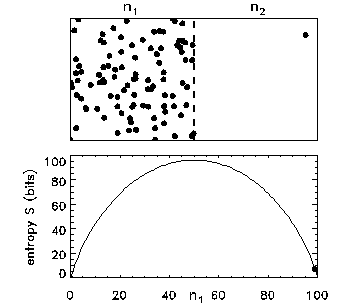The idea behind the information equilibrium framework for economics is an attempt to leverage the very useful principle of maximum entropy formulated by E.T. Jaynes without presuming the form of the economic "constraints", i.e. the conservation laws and forces.
Back in 1991, Jaynes mused about applying entropy to economics, and I present a selection here. I hadn't gone back and re-read the paper since developing my own concept of economic entropy, and makes me think I should look at entropy gradients.
Anyway, I think this discussion helps make the idea of how an economy can work without rational, utility maximizing agents -- economic entropy appears to be governed by NGDP = N, with S ~ log N! ~ N log N and we can show ΔS ~ ΔN. What is interesting is that e.g. recessions appear to be violations of what would be called the "second law of economics". The reason you only get brief microscopic violations of the second law of thermodynamics, but you can get serious violations in economics is that humans will spontaneously coordinate their actions ... in a panic or a less severe sudden onset of economic pessimism (reducing entropy).
Anyway, I was unable to directly link to the paper, but here's a Google search that has it at the top. Enjoy!
https://www.google.com/search?q=entropy+economics+jaynes
HOW SHOULD WE USE ENTROPY IN ECONOMICS?
E. T. Jaynes
What that [economic entropy picture] suggests is the following. Even though a neighboring macroeconomic state of higher entropy is available, the system does not necessarily move to it. A pile of sand does not necessarily level itself unless there is an earthquake to shake it up a little. The economic system might just stagnate where it is, unless it is shaken up by what an Englishman might call a "dither" of some sort.
...
In our conjectured picture of things, the dither that prevents economic stagnation and drives us up the entropy hill is a kind of turbulence injected into the macroeconomic variables by fluctuations in the underlying microeconomy. By this means, the macroeconomic state is constantly driven to "exploring the possibilities" of neighboring states.
...
In economics, the idea of the dither was anticipated by Keynes, who attributed it to "animal spirits", which cause people to behave erratically. We think of the dither in more general terms, simply the result of many independent individual decisions, not necessarily erratic or irrational. Indeed, most individuals will act according to what seem to them, "rational expectations." However, without the entropy factor Keynes did not find the phenomenon that our model considers a fundamental cause of economic change. In constantly exploring the neighboring states, the economy is always more likely to move to one of higher than lower entropy, simply because there are more of them (greater multiplicity). Thus the dither not only introduces random uncertainty into macroeconomic variables, it drives a systematic movement of the economy. In fact, mathematical analysis shows that the average drift velocity in the macroeconomic space is proportional to [the entropy gradient]

Another one I missed the 1st time around. I love the sub-title:
ReplyDelete"(Some half-baked ideas in need of criticism)"